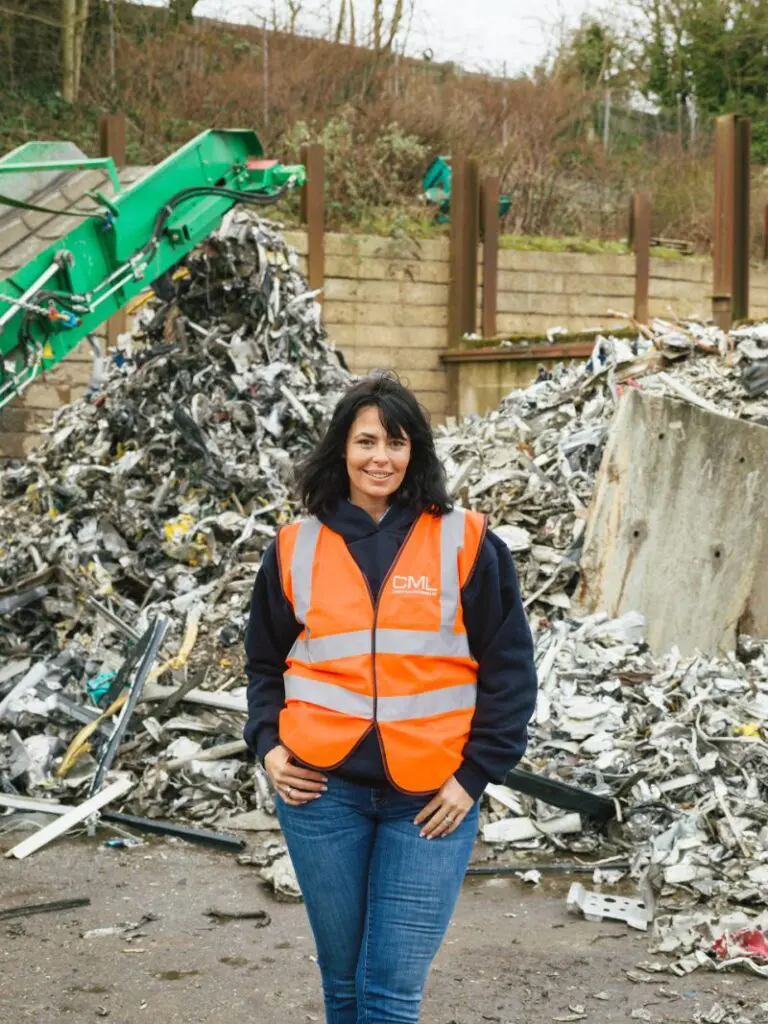Copper and aluminium are building blocks of our everyday life, powering the electronics we use and the vehicles we drive. UK recycler Amy Bird knows the the scrap end of the market like her back pocket.
Someone who grew up in scrap is UK recycler Amy Bird, who co-owns two businesses, Countrywide Metals Recycling in Birmingham and Connolley Metals in London. The latter, which majors in ferrous scrap, was launched by her parents Jim and Pat Connolley in the 1970s under the name Jighand.
A familiar passion
The former is a passion project, her ‘baby’, dealing mostly in aluminium and copper scrap. Countrywide Metals’ material comes mostly from the building & construction, automotive and electronics sectors.
The bulk of scrap being processed is aluminium (25 000 tonnes a year), with copper at 10 000 tonnes a year. Production scrap is of a very high quality, typically going back into the same applications.
Bird has had an interesting career, including eight years as a professional model. Her first flight anywhere was as a shy 19-year-old to a major New York modelling agency. But her love for scrap never went away.
‘In between modelling jobs, I was right back at the yard, Bird says. ‘My parents ensured I didn’t sit around doing nothing. They kept me on my feet, learning about the trade.’
In hindsight, she is very thankful. ‘Holding my ground in the toxic fashion industry for almost a decade taught me a thing or two about setting boundaries and reading people. That certainly helped me navigate the scrappy lifestyle.’
Quick-paced
Bird believes the non-ferrous market is definitely more volatile than the one she witnessed as a teenager. ‘With steel, certainly, you’d see movement in prices perhaps weekly; with aluminium and especially copper I have to follow the LME every day, practically by the minute!’ she says with a laugh.
‘I have five guys on the road buying scrap up and down the country amidst all this volatility. They know prices can change at a moment’s notice and we have to try to get the best deal.’
Bird recalls occasions when a number of foundries in her network unexpectedly decided they did not want material in a particular week. ‘Then I’m left with, say, 25 tonnes of bright wire scrap. It means I’m gonna switch up my strategy because I can’t sit and hold that for an indefinite period.
‘Non-ferrous scrap is an intense and quick-paced market, definitely at the sharper end of the scrap business.’
She adds: ‘The other thing with us recycling guys, particularly in the metal space, is that we forget what the price was last year. We live very much in the present. We always laugh about it when speaking to other people in scrap, which pretty much means all of us are complaining how terrible business is.’
‘You very rarely hear someone say it’s absolutely boring. After all, unfortunately for us, margins tend to stay the same. Regardless of the upside or the downside, we follow it up, we follow it down. You get a few juicy parts sometimes but generally you’re risk-averse and locking in as you go.’
Big, big world
Squeezing the margins has become trickier as the scrap world is now so much bigger and more transparent. ‘Back in the day, if you were a small scrap player, you sold to a bigger one, and they would export the material,’ Bird observes. ‘Now, as long as you’re interested, anything is possible.’
‘Trade is a worldwide market, open to anybody. Prices are just one click away. All you need is material and an internet connection, really.’
She adds that her company tends to stay away from high grade copper because the returns are too small compared to the large sums being laid out.
Countrywide Metals Recycling accepts loads ranging from 20kg to 20+ tonnes, catering to the wider recycling sector. Aside from a dozen company-owned collection trucks, Bird has about 700 registered ‘freelancers’ who bring in scrap on a regular basis.
‘There are a lot of people working for themselves these days. I am happy to help them make an honest living.’
A ‘direct hit’
She reports that the volume of material inflow to UK yards in July and August was very small. ‘That is not really market relative, it’s to do with macroeconomics.’
‘Just consider this, if people are worried about buying groceries, their job security or increased cost of living, they are not going to replace their cars or electronics. That means less material coming in for us. That’s a direct hit.’
Those yards that do get hold of enough material want to hold out for every last penny. ‘In other words: push, push, push,’ Bird says. ‘We end up in close competition with other scrap players. That said, at the point of speaking to you now, in mid-August, the tap was off for aluminium sales from the UK.’
‘If they came at all, it wasn’t a great price. But the last three days, the phone hasn’t stopped ringing.’
Read the full article in the upcoming issue
Don't hesitate to contact us to share your input and ideas. Subscribe to the magazine or (free) newsletter.



